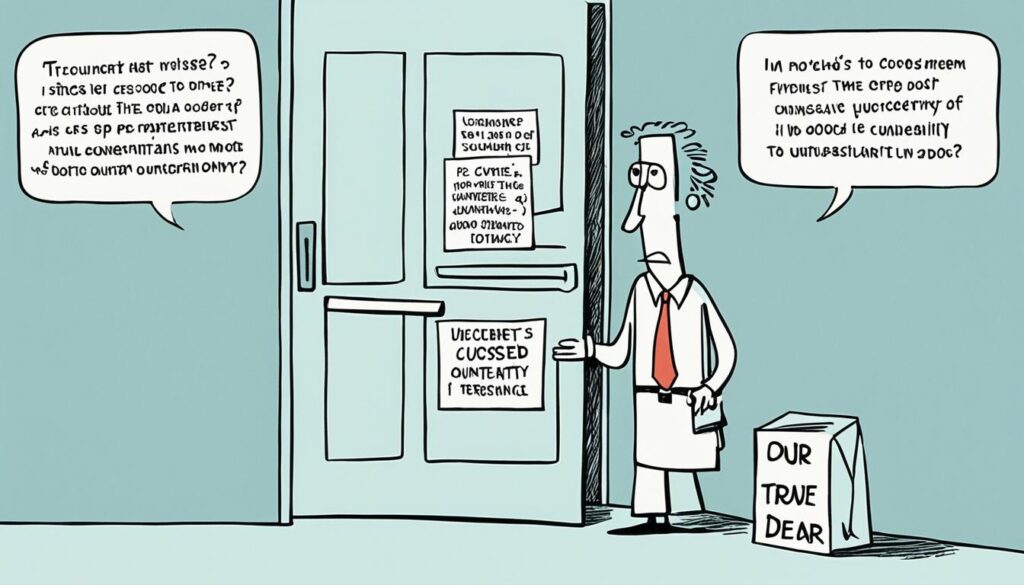Understanding introverts and their unique needs is crucial when you are in a relationship with one. Introverts have a different way of processing the world and often thrive in quiet, introspective environments. But how do you navigate this dynamic and create a fulfilling connection with your introverted partner? Let’s explore nine thoughtful ways you can be there for your introverted partner.
When you are in a relationship with an introvert, it’s important to understand their behavior patterns, communication preferences, and personal boundaries. By embracing their introversion and adapting your approach, you can create a strong and harmonious bond based on mutual understanding and respect.
Key Takeaways:
- Take the time to understand and speak your introverted partner’s love language.
- Respect their need for personal space and create a comfortable environment for them to recharge.
- Create opportunities for deep, meaningful conversations to connect emotionally.
- Engage in shared hobbies and quiet activities to strengthen your bond.
- Accept your introverted partner for who they are and appreciate their uniqueness.
Learn Their Love Language
Just like extroverts, introverts have different ways of expressing and receiving love. Take the time to discover your partner’s love language, whether it’s through acts of service, words of affirmation, quality time, physical touch, or receiving gifts. By understanding and speaking their love language, you can create a stronger emotional connection with your introverted partner.
Understanding your partner’s love language can help you navigate the intricacies of their introverted nature. For example, if their love language is acts of service, you can show your love and support by helping them with tasks or responsibilities they find overwhelming. If their love language is quality time, you can plan special activities that allow for meaningful one-on-one interactions.
By speaking your partner’s love language, you show them that you understand and appreciate their unique needs. This can help foster a deeper emotional connection and build a solid foundation for your relationship.
| Love Languages | Examples |
|---|---|
| Acts of Service | Helping with household chores or errands |
| Words of Affirmation | Offering verbal appreciation and encouragement |
| Quality Time | Engaging in focused and uninterrupted conversations or activities |
| Physical Touch | Expressing affection through hugs, cuddling, or gentle touches |
| Receiving Gifts | Surprising your partner with thoughtful and meaningful presents |
Remember, discovering and understanding your partner’s love language is an ongoing process. It may take time and open communication to fully grasp their needs and preferences. However, the effort you put into learning their love language will be rewarded with a deeper emotional connection and a more fulfilling relationship.
Respect Their Sensitivities
Introverts often have sensitivities to external stimuli, such as noise, crowds, or interruptions. Sensory overload can drain their energy and make them feel overwhelmed. It is essential to respect their boundaries and create an environment that allows them to recharge.
One important aspect of respecting their sensitivities is to be mindful of their need for personal space. Introverts value their alone time and require it to refuel and regain their energy. Encourage them to have their designated quiet space where they can retreat and unwind.
Avoid pushing introverts into social situations that they are not comfortable with. Understand that they may prefer smaller, intimate gatherings or one-on-one interactions rather than large, noisy parties. Respect their choice and communicate openly about what they are comfortable with.
“Being an introvert means I have different comfort levels when it comes to noise and crowds. My partner has been incredibly understanding and always checks in with me before making plans that involve groups of people. It makes me feel respected and loved.” – Emily, introvert
Noise sensitivity is another common challenge for introverts. Loud and chaotic environments can be overwhelming and exhausting for them. Be mindful of the noise levels in your shared living spaces and consider using earplugs or noise-canceling headphones when necessary. Creating a peaceful and quiet atmosphere will help introverts feel more at ease.
In summary, respecting the sensitivities of introverted partners is crucial for a harmonious relationship. By understanding and valuing their need for personal space, comfort zones, and peace, you can create an environment that allows them to thrive and feel understood.
| Ways to Respect Introverts’ Sensitivities |
|---|
| 1. Designate a personal space for them to recharge |
| 2. Avoid pushing them into social situations they are uncomfortable with |
| 3. Manage noise levels in shared living spaces |
| 4. Encourage open communication about comfort levels |

Make Time for Meaningful Conversation
Meaningful conversation is a vital aspect of building a strong connection with your introverted partner. It provides an opportunity for them to share their thoughts, feelings, and experiences on a deeper level. By dedicating specific time to engage in deep discussions, you can create a space for them to open up and express themselves authentically.
Listening attentively is crucial during these conversations. Show genuine interest in what they have to say and allow them to speak without interruptions. By actively listening and responding with empathy, you can foster a sense of trust and emotional intimacy.
Connecting emotionally is the core goal of meaningful conversations with your introverted partner. It involves understanding their emotions and responding in a supportive and understanding manner. This emotional connection allows you to strengthen your bond and cultivate a deeper understanding of each other.
Example:
Partner: I’ve been feeling overwhelmed lately with work and personal commitments.
You: I’m here for you. Tell me more about what’s been going on.
Partner: Well, I feel like I’m constantly juggling tasks and never have time for myself. It’s starting to take a toll on me.
You: I can understand how that can be challenging. It’s important to prioritize self-care and find a balance. What can we do together to support you during these busy times?
| Benefits of Meaningful Conversation | Actions to Take |
|---|---|
| Strengthen emotional bond |
|
| Enhance understanding of each other |
|
| Promote a sense of trust and vulnerability |
|
Share Compatible Hobbies
Engaging in shared hobbies and activities is a great way to bond with your introverted partner. By finding activities that align with both of your interests, you can create quality time together and provide opportunities for meaningful connections.

For example, you can go for a hike in nature, enjoying the peaceful surroundings and taking in the beauty of the outdoors. This allows you to engage in a quiet activity that provides relaxation and enjoyment for both you and your partner.
| Benefits of Sharing Compatible Hobbies |
|---|
| 1. Quality time spent together |
| 2. Strengthening the bond between you |
| 3. Creating shared memories |
| 4. Providing opportunities for personal growth and learning |
In addition to outdoor activities, you can also engage in quiet indoor hobbies such as cooking together or enjoying a quiet night in with a movie or book. These activities allow you to relax and enjoy each other’s company while pursuing personal interests.
Benefits of Sharing Compatible Hobbies:
- Quality time spent together
- Strengthening the bond between you
- Creating shared memories
- Providing opportunities for personal growth and learning
By engaging in shared hobbies, you can create a space for conversation, collaboration, and connection. It allows you and your partner to explore each other’s worlds and interests, fostering a deeper understanding and appreciation for one another.
Accept Who They Are Naturally
It’s essential to fully accept and embrace your introverted partner for who they are. Introverts thrive in their inner world and find value in solitude and reflection. Avoid trying to change them or push them out of their comfort zone. Instead, celebrate their uniqueness and appreciate the qualities that make them an introvert.
| Key Points |
|---|
| Embrace their introversion |
| Respect their need for solitude |
| Support their reflective nature |
| Celebrate their uniqueness |
| No need to change or push them |
Remember, your introverted partner’s introversion is not something that needs fixing. It’s an inherent part of who they are, and it’s what makes them unique and special. By accepting and embracing their introverted nature, you show them that you value and love them for who they truly are.
Instead of trying to change or mold them into someone they’re not, focus on creating an environment that allows them to thrive. By understanding their need for solitude and reflection, you can provide the space and support they need to recharge and feel their best. This could mean giving them alone time to pursue their hobbies or interests, or simply respecting their boundaries when it comes to socializing.
Remember that introverts have their own way of experiencing the world, and it’s important to celebrate their uniqueness. They bring a different perspective and depth to relationships, and by appreciating their introverted qualities, you can build a stronger and more fulfilling connection.
Communicate Your Care in Their Love Language
When it comes to expressing your care and affection for your introverted partner, effective communication is key. Understanding and speaking their love language can make a significant impact on your relationship. By using words of affirmation, showing appreciation through thoughtful gestures, and creating special quality time moments, you can tailor your communication to their needs and make them feel truly cherished.
For example, if your partner’s love language is words of affirmation, take the time to express your love, admiration, and support through verbal or written appreciation. This can be as simple as leaving them a heartfelt note or sending a loving text message.

Another way to communicate your care is through thoughtful gestures. Pay attention to the little things that make your partner happy and surprise them with small acts of kindness. It could be preparing their favorite meal, buying them a thoughtful gift, or planning a special date night that aligns with their interests.
Additionally, creating special quality time moments can deepen your connection with your introverted partner. Set aside dedicated time to engage in activities they enjoy, such as going for a nature walk, reading together, or having a deep and meaningful conversation over a cup of tea.
Remember, effective communication goes beyond just speaking their love language. It requires active listening, empathy, and understanding. Take the time to truly listen to your partner, validate their feelings, and respond thoughtfully. By communicating your care in their love language, you can foster a deeper emotional connection and strengthen your relationship.
| Benefits of communicating in their love language |
|---|
| Builds a stronger emotional connection |
| Makes your partner feel valued and understood |
| Enhances overall relationship satisfaction |
| Increases intimacy and trust |
| Leads to better mutual understanding |
Compromise to Meet Both Needs
In an introvert-extrovert relationship, finding a balance that meets both partners’ needs is crucial. Recognize that you and your introverted partner may have different preferences when it comes to socializing or alone time. To maintain a healthy and fulfilling relationship, it’s important to:
- Compromise: It’s essential to find middle ground by considering each other’s needs and preferences. Discuss and negotiate compromises that work for both of you.
- Balance: Strive to strike a balance between the introvert’s need for alone time and the extrovert’s desire for social interaction. This may involve scheduling dedicated alone time for the introvert and planning social activities that the extrovert enjoys.
- Adaptation: Be open to adapting your routines and activities to accommodate each other’s comfort levels. Flexibility and willingness to make adjustments can contribute to a harmonious relationship.
- Meet halfway: Both partners should make an effort to meet halfway and engage in activities that cater to both their introverted and extroverted qualities. This demonstrates mutual understanding and fosters a sense of equality in the relationship.
- Mutual understanding: Strive to understand and empathize with each other’s needs and preferences. Discuss openly and honestly to develop a deeper understanding of one another, which can lead to greater mutual appreciation and respect.
By practicing compromise, balance, adaptation, meeting halfway, and fostering mutual understanding, introvert-extrovert relationships can thrive and flourish.
Check Assumptions at the Door
When it comes to understanding introverts, it’s crucial to approach them with an open mind and avoid making assumptions or generalizations. Each introvert is an individual with unique personalities and experiences.
Instead of assuming, take the time to communicate openly about your needs and expectations. By having honest and transparent conversations, you can gain a better understanding of each other’s perspectives and build a stronger connection.
Here’s an example of how you can apply open-mindedness and clear communication in your relationship with an introvert:
Person A: “I’ve noticed that you often prefer spending time alone. Is everything okay?”
Person B (Introvert): “Yes, I enjoy my alone time to recharge. It’s essential for me to have that space for reflection and introspection. It doesn’t mean I don’t value our time together, though. I appreciate your understanding.”
By avoiding assumptions and actively listening to your introverted partner’s perspective, you can foster a deeper connection and prevent misunderstandings in your relationship.
Here’s a table summarizing the key points:
| Key Points |
|---|
| Avoid assumptions |
| Practice open-mindedness |
| Communicate openly |
| Strive to understand their perspective |

Remember, approaching your introverted partner without assumptions and with open-mindedness can lead to a deeper understanding and a more fulfilling relationship.
Appreciate Their Sensitive Nature
One of the remarkable qualities that introverts possess is their deep level of emotional awareness and empathy. They have an innate ability to understand and connect with others on a profound level. Celebrate and appreciate this aspect of their nature, as it contributes to the depth and richness of your relationship. By acknowledging their sensitive nature, you can foster a stronger emotional connection and create an environment that allows them to thrive.
Empathy is a powerful tool that introverts use to navigate their relationships. They have an incredible capacity to understand and share the feelings of others. Recognize and honor their empathy by actively listening and validating their emotions. This will create a safe space for open and honest communication, promoting a deeper bond between you.
Understanding and supporting an introvert’s need for self-care, reflection, and emotional processing is crucial. Respect their desire for solitude and quiet time. Encourage them to engage in activities that help them recharge and find inner peace. By providing the support they need to prioritize their well-being, you demonstrate your commitment to their happiness and personal growth.
Remember, supporting your introverted partner goes beyond simply appreciating their sensitive nature. It also involves being patient and understanding during their moments of introspection and quietness. Show them that you are there for them, ready to offer support and a listening ear whenever they need it. By celebrating their unique qualities and providing a nurturing environment, you can strengthen your connection and build a fulfilling relationship.
FAQ
What are some ways to support and understand an introverted partner?
Here are nine thoughtful ways you can be there for your introverted partner:
How can I learn my introverted partner’s love language?
Take the time to discover your partner’s love language, whether it’s through acts of service, words of affirmation, quality time, physical touch, or receiving gifts.
How should I respect my introverted partner’s sensitivities?
Respect their need for personal space, boundaries, and create a comfortable environment for them to recharge. Avoid pushing them into overwhelming social situations or exposing them to excessive noise or activity.
How can I make time for meaningful conversations with my introverted partner?
Set aside dedicated time to connect with your introverted partner and engage in deep, meaningful conversations. Practice active listening and show genuine interest to strengthen emotional bonds.
What are some ways to bond with my introverted partner through shared hobbies?
Find activities that align with both your interests, such as hiking in nature, cooking together, or enjoying quiet nights with movies or books. This will create quality time and opportunities for meaningful connections.
Should I try to change my introverted partner or push them out of their comfort zone?
No, it’s important to fully accept and embrace your introverted partner for who they are. Celebrate their uniqueness and appreciate the qualities that make them an introvert without trying to change them.
How can I communicate my care for my introverted partner?
Express your care and affection in ways that resonate with their love language. Use words of affirmation, show appreciation through thoughtful gestures, or create special quality time moments tailored to their needs.
How can we find a balance between our different needs as an introvert-extrovert couple?
Recognize and respect that you and your introverted partner may have different preferences regarding socializing and alone time. Make compromises, adapt to each other’s comfort levels, and find ways to meet halfway for a healthy and fulfilling relationship.
How should I approach my introverted partner without making assumptions?
Avoid making assumptions or generalizations about introverts. Approach your partner with an open mind, communicate openly about your needs, and strive to understand their perspective to foster a deeper connection and prevent misunderstandings.
How can I appreciate and support my introverted partner’s sensitive nature?
Recognize and appreciate their emotional depth and empathy. Be understanding of their need for self-care, reflection, and emotional processing, and provide support where needed.

